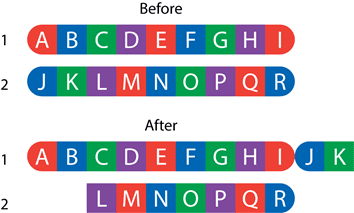
Unit 5: Test Review
Quiz by Amanda Wood
Feel free to use or edit a copy
includes Teacher and Student dashboards
Measure skillsfrom any curriculum
Measure skills
from any curriculum
Tag the questions with any skills you have. Your dashboard will track each student's mastery of each skill.
With a free account, teachers can
- edit the questions
- save a copy for later
- start a class game
- automatically assign follow-up activities based on students’ scores
- assign as homework
- share a link with colleagues
- print as a bubble sheet
17 questions
Show answers
- Q1The figure below shows two homologous chromosomes undergoing a type of mutation called translocation. Each letter in the figure represents a single gene. This mutation is most likely to cause negative effects by —reversing DNA nucleotidesdestroying genetic informationadding new chromosomesexpressing genes differently30s
- Q2Which mutation would change the greatest number of amino acids in a protein?the substitution of a thymine nucleotide with a cytosine nucleotide near the beginning of a genethe addition of the nucleotides that make up an additional stop codon to the end of a genethe deletion of a single adenine nucleotide in the middle of a genethe insertion of a thymine, a guanine, and an adenine nucleotide in that order at the start of a gene30s
- Q3Mutations within the DNA sequence of an organism can —all of the aboveresult in alterations that are harmful to an organismresult in alterations that do not effect the organismresult in alterations that are helpful to an organism30s
- Q4A codon chart is shown below.Which of these changes to the DNA triplet 3’ GCT 5’ will affect the protein produced?GCATCTTCCGTT30s
- Q5A segment of DNA produces methionine, threonine, histidine, aspartate, and glycine when translated. A substitution mutation occurs and causes the synthesis of the segment as shown. Which is the new peptide chain when the new DNA segment is translated?Methionine, serine, histidine, aspartate, glycineMethionine, leucine, histidine, aspartate, glycineMethionine, proline, histidine, aspartate, glycineMethionine, phenylalanine, histidine, aspartate, glycine30s
- Q6A model of a DNA molecule is shown below. The arrow indicates —the junction of introns and exons in the sense strand of DNAthe hydrogen bond between complementary nucleotidesthe bond between adjacent phosphate and deoxyribose moleculesthe junction of a codon and a DNA triplet30s
- Q7How does DNA in cells determine an organism’s complex traits?DNA produces the energy an organism needs in order to grow.DNA separates into long single strands that make up each part of an organism.DNA contains codes for proteins, which are necessary for the growth and functioning of an organism.DNA folds into the nucleus of each of the cells of an organism.30s
- Q8The sequence of nitrogenous bases in DNA varies widely. The sequence of the bases in DNA is most important for which of the following?Helping form the sugar-phosphate backbone of DNA moleculesAllowing the DNA to have the shape necessary for replicationProviding the instructions for the traits of an organismPreventing mutations from occurring during DNA replication30s
- Q9A segment of DNA is represented in the illustration. How is information for a specific protein carried on the DNA molecule?As a sequence of nucleotidesIn the ratio of adenines to thyminesIn the double-helix shape of the condensed chromosomeAs a pattern of phosphates and sugars30s
- Q10The process represented in the diagram produces a molecule that is complementary to thetemplate strand of DNA. What type of molecule is produced?CarbohydratePolypeptideMessenger RNANew DNA30s
- Q11Part of an important cellular process involving a DNA strand is modeled below.What is the purpose of this cellular process?Preserving genetic information for future generationsTranscribing information in the DNA sequence for use by the cellDeleting the information in the sequence produced from the DNA templateProducing more nucleotides for the DNA sequence30s
- Q12A model of a biological process is shown. What is the purpose of this process?To synthesize amino acids used to unzip strands of DNA and copy the genetic codeTo assemble nucleotides in an mRNA chain along a DNA templateTo replicate the DNA of an organism before cell divisionTo translate the genetic code into a specific sequence of amino acids30s
- Q13In the process of translation, the ribosome is the site where —DNA strands are separated and copiedinformation from DNA is copied to RNAfree floating amino acids are picked up by tRNAamino acid chains are assembled from information in the mRNA30s
- Q14Study the sentences describing the steps of protein synthesis. Which sequence places the steps in the correct order? 1. Transfer RNA picks up individual amino acids and carries them to the ribosome. 2. Ribosomal RNA bonds mRNA and tRNA. 3. A single strand of DNA serves as a template for making mRNA. 4. Messenger RNA carries the sequence of nucleotides to the ribosomes. 5. A protein is synthesized.3,2,4,5,12,4,1,5,33,4,1,2,52,5,3,4,130s
- Q15Which type of ribonucleic acid carries the coding information to the site of protein synthesis?sRNAtRNArRNAmRNA30s
